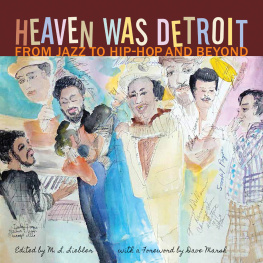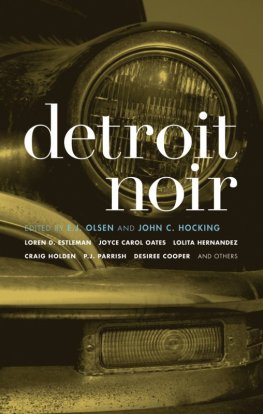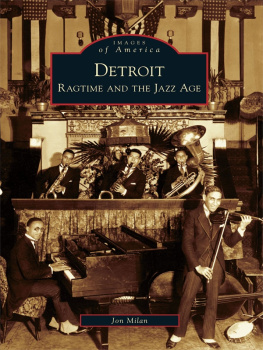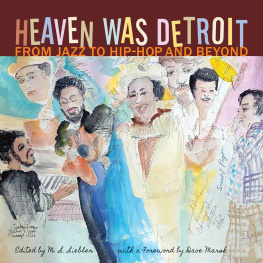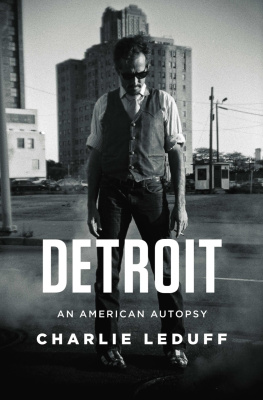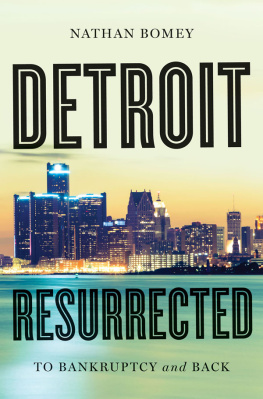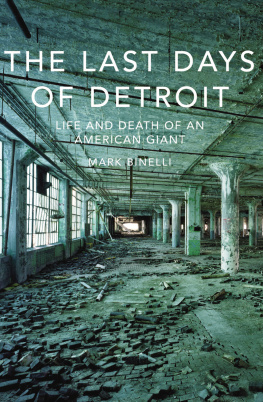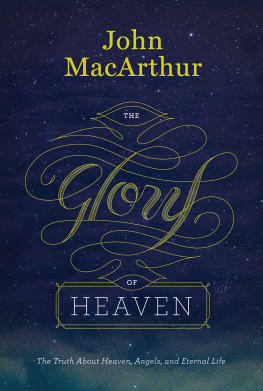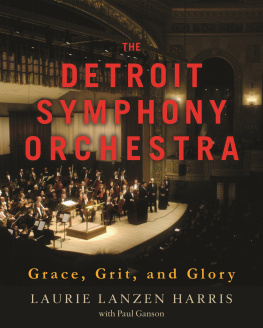Edited by M. L. Liebler - Heaven Was Detroit
Here you can read online Edited by M. L. Liebler - Heaven Was Detroit full text of the book (entire story) in english for free. Download pdf and epub, get meaning, cover and reviews about this ebook. publisher: Wayne State University Press, genre: Non-fiction. Description of the work, (preface) as well as reviews are available. Best literature library LitArk.com created for fans of good reading and offers a wide selection of genres:
Romance novel
Science fiction
Adventure
Detective
Science
History
Home and family
Prose
Art
Politics
Computer
Non-fiction
Religion
Business
Children
Humor
Choose a favorite category and find really read worthwhile books. Enjoy immersion in the world of imagination, feel the emotions of the characters or learn something new for yourself, make an fascinating discovery.
- Book:Heaven Was Detroit
- Author:
- Publisher:Wayne State University Press
- Genre:
- Rating:5 / 5
- Favourites:Add to favourites
- Your mark:
- 100
- 1
- 2
- 3
- 4
- 5
Heaven Was Detroit: summary, description and annotation
We offer to read an annotation, description, summary or preface (depends on what the author of the book "Heaven Was Detroit" wrote himself). If you haven't found the necessary information about the book — write in the comments, we will try to find it.
Heaven Was Detroit — read online for free the complete book (whole text) full work
Below is the text of the book, divided by pages. System saving the place of the last page read, allows you to conveniently read the book "Heaven Was Detroit" online for free, without having to search again every time where you left off. Put a bookmark, and you can go to the page where you finished reading at any time.
Font size:
Interval:
Bookmark:

2016 by Wayne State University Press, Detroit, Michigan 48201. All rights reserved.
No part of this book may be reproduced without formal permission.
Manufactured in the United States of America.
20 19 18 17 16 5 4 3 2 1
ISBN 978-0-8143-4122-3 (paperback)
ISBN 978-0-8143-4123-0 (ebook)
Library of Congress Cataloging Number: 2016940283

Designed and Typeset by Bryce Schimanski
Composed in Adobe Caslon Pro
Wayne State University Press
Leonard N. Simons Building
4809 Woodward Avenue
Detroit, Michigan 48201-1309
Visit us online at wsupress.wayne.edu
For Steve King and Joel Martin
who opened the door and invited me in
and
for Eddie Baranek
who carries the flame of music in Detroit forward
CONTENTS
by Dave Marsh
by M. L. Liebler
Al Young
Lars Bjorn and Jim Gallert
Gary Carner
Lars Bjorn and Jim Gallert
Larry Gabriel
John Sinclair
Bill Harris
W. Kim Heron
R. J. Spangler
Marsha Music
Rev. Robert B. Jones Sr.
John Sinclair
John Sinclair
S. R. Boland
Matthew Smith
Matthew Smith
S. R. Boland
Joel Martin
Michael Hurtt
Gary Graff
Bill Harris
Herb Jordan
Melba Joyce Boyd
Peter Benjaminson
Peter Benjaminson
Herb Jordan
Pat Thomas
Ben Edmonds
Peter Benjaminson
Susan Whitall
John Sinclair
Rebecca Tyner Derminer
Gary Graff
Willy Wilson
Gary Graff
John G. Rodwan Jr.
Scott Morgan
George Moseman, a.k.a. Moseley the Punk
Mike Dutkewych
Lester Bangs
Jaan Uhelszki
Howard A. Dewitt
Diane Spodarek
Ben Blackwell
Danny Kroha
Brian McCollum
Gary Graff
Thomas Trimble
Matt Deapo
Greil Marcus
Bill Holdship
Hobey Echlin
Shane M. Liebler
Daniel Jones
Brian Smith
Craig Maki
Rhonda Welsh
Chris Morton
Dan Carlisle
Rick Allen
L. E. Grimshaw
Dr. Herman Daldin
Aaron Anderson
Pat Thomas
Ben Blackwell
Hobey Echlin
Ben Blackwell
Jarrett Koral
FOREWORD
Makin Thunder
We were young and proud
We were makin Thunderbirds
Bob Seger
T he ores came from West Virginia, Bolivia, Asia. The rubber from Africa, then Akron. The men who made the steel and aluminum were from Eastern Europe, China, Mexico, Tennessee, and Alabama, not to mention most of the places in between. Sometimes, the fathers of the men who assembled the finished parts were men whose own fathers (or grandfathers, or both) had done the same. Sometimes they were newly arrived from Lebanon, Oklahoma, Latvia, or Louisiana. Sometimes their families had come many generations past from Scotland or the west coast of Africa or Central America. Ships, trains, and trucks moved the raw materials, down from Lake Superior or across the Atlantic or up through Kentucky and Indiana, where many of the men who manned those vessels had their origins. Men from Canada and the Michigan thumb, Georgia, Greece, South Carolina, Traverse City, operated the trucks that took the finished cars all over the United States and, ultimately, all over the world. A significant number of the men, which is how everyone referred to the workers, were women.
They were the richest working people in the history of the world, if they didnt get laid off or replaced by machinery, fall into the foundry furnace, punch a foreman, show up drunk (well, drunk enough), or have their fingers smashed or their legs broken by the machines or the line that crawled by, never quite slowly enough. They had, most of the time, not a damned thing in common. But most of them shared a pride in the cars they produced, a love of how they looked and their speed, not to mention their sex appeal. Some grew so besotted that they went home and tinkered with their own vehicles, creating a whole culture of cruising cars. This hobby allowed them to pay the close attention to detailfrom the motors to the paintthat the line prevented them from exercising, no matter how slowly it sped by. Even those who prayed every night that their kids would never have to work in a place so loud it really hurt, as Bob Seger sang in Makin Thunderbirds, sometimes shared in this attitude. They were proud that autoworkers could come up with designs more beautiful, and far faster, than those of the companys big shots.
Detroit music shares a lot with the auto world. (Not that anyone whos made it in this scene was only in it for a paycheck.) The music comes with all sorts of personalitiesand when I say all sorts, I dont mean many or more than a few; I mean every one of them (that I know anything about) is neither a leader nor a follower. Whats come out of the Motor City, on stage and on record, is nothing like the immediately recognizable musical signatures of New Orleans, Nashville, Memphis, or even Austin, or in certain periods Kansas City, San Francisco, and Hollywood. Detroit has an attitude, but its not necessarily, as some have claimed, that the music is particularly aggressive (although the aggressive music is truly aggressive); or oriented to madmen; or even that most of those whove made their mark were working class, except in the very broadest sense. Even then, Berry Gordys family members were very successful strivers, and Aretha Franklins father was the best-known preacher in town, even to white people. But Stevie Wonders talent was first discovered on the doorstep of a housing project, Eminems mother was straight out of Eight Mile (the street if not the movie), and I could give you two dozen other examples, none of them obscure. It isnt where you come from, not here. Its where you wind up.
I have thought and written about this subjectDetroit music as a generalityfor going on fifty years, and I still cannot find the place where Iggy Pops scabrous screams unite with the cool elegance of Tommy Flanagans jazz piano. Nor where Levi Stubbss psychodrama on Bernadette intersects in any musical (or perhaps diagnostic) sense with Del Shannons psychodrama on Stranger in Town. I can explain the blackness of Mitch Ryders soul-rock singing and the whiteness of the Funkadelics funk-rock, insofar as illusions can be explained, but not what Bootsy Collins and Anita Baker share that is somehow distinctively Detroit. I can hear it, sure enough, but not articulate it in a way that might make sense to someone who never lived in Michigans southern peninsula (from which, dont forget, Toledo was long ago stolen). And for that matter, I cant explain how any of this could have, even in its most mischievous prankster mode (that is, Insane Clown Posse), led to the national disgrace of Ted Nugent. But then I cannot exactly explain how it led to the never-simple glory of Aretha Franklin or even the contrasting greatness of Bob Seger, Marvin Gaye, and Marcus Belgrave. (Dont tell me that aint a balanced equation, though.) I can comprehend Elvin Jones, Johnny Bee, Benny Benjamin, Pistol Allen, and Uriel Jones as stylists, but its hard enough to tie together the three Motown drummers (which is why there
Next pageFont size:
Interval:
Bookmark:
Similar books «Heaven Was Detroit»
Look at similar books to Heaven Was Detroit. We have selected literature similar in name and meaning in the hope of providing readers with more options to find new, interesting, not yet read works.
Discussion, reviews of the book Heaven Was Detroit and just readers' own opinions. Leave your comments, write what you think about the work, its meaning or the main characters. Specify what exactly you liked and what you didn't like, and why you think so.

